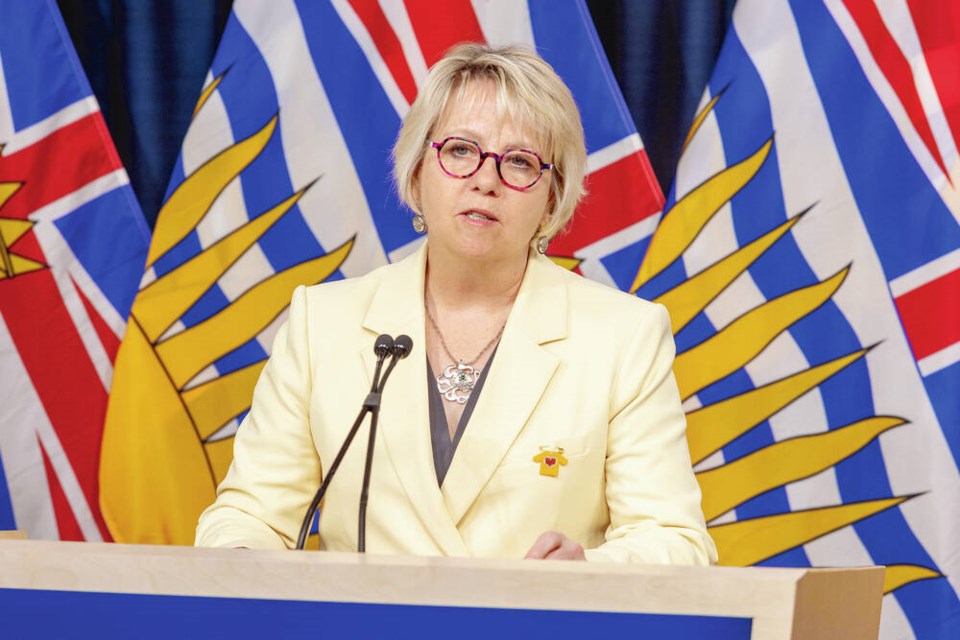B.C. is preparing to roll out the newest COVID-19 vaccine in September or October, says the province’s top doctor, calling the shot less of a booster and more of an update.
The latest formulation of the COVID-19 mRNA vaccine by Pfizer-BioNTech and Moderna is under review by Health Canada. If and when it’s approved, provincial health officer Dr. Bonnie Henry is hopeful for a late September or early October start.
“I’m really thinking of this as an updated seasonal vaccine, as opposed to a booster, because the protection that we have from the previous vaccines that we’ve received still provides good strong cell-mediated immunity,” Henry said in an interview.
The province is gearing up for a fall booster campaign on the heels of last month’s recommendation from the National Advisory Committee on Immunization that people get the updated vaccine once it’s released this fall if it has been six months or more since their last dose or infection.
NACI said increased protection will help reduce the impact of COVID-19 on the health system while other respiratory viruses, including influenza and respiratory syncytial virus (RSV), are circulating in the fall and winter.
Prior infection plus vaccination gives people hybrid immunity, which is considered to be greater protection against infection and severe disease than either vaccination or infection alone. That’s particularly the case when hybrid immunity involves a recent Omicron infection, NACI said.
An additional dose of vaccine starting this fall is particularly important for those who have not been previously infected and have protection from vaccination alone, the national advisory committee said.
The committee said those who could especially benefit from the updated vaccine include people age 65 and older, long-term care residents, pregnant people, the immune-compromised, First Nations, Métis and Inuit community members, and people providing essential community services.
Henry said the very young are also at risk, and “every study we look at” shows if you’re unvaccinated, you have a much higher risk of having more severe illness and being hospitalized.
“Regardless of how many vaccines you’ve had in the past, getting this updated one will be important for everybody … to protect you going into this fall.”
Henry said the update is similar to what happens with influenza vaccines, where there’s an updated shot every year.
The new formulation will be a monovalent vaccine — consisting of one Omicron strain, likely XBB.1.5 — as opposed to the bivalent vaccine, consisting of the original Wuhan virus and an earlier Omicron strain, that was offered last fall.
The updated vaccine, multiple millions of doses of which have been given safely, Henry said, is the same “well-proven” technology with just the circulating strains updated — as is done in the flu vaccine.
Henry said it’s too early to know if the COVID-19 vaccine will be a seasonal shot. “Omicron has stayed relatively stable for almost a year and a half now, so we’ll see what happens through this next respiratory season,” said Henry.
“It may be that this updated vaccine will last longer than a year — those things we are still learning as we go.”
Globally, the “good news” is we’re at the lowest-risk period of COVID-19 infection since the pandemic started, said Henry.
Based on wastewater and patient testing results, infections are way down. “We look at hospitalizations and we’ve had the fewest people in hospital and it’s consistent around the globe.”
Sally Otto of the COVID-19 Modelling Group said she’s not aware of any ongoing modelling by an independent modelling group that is projecting into the fall, but she agreed there’s been a “substantial dip” in reported cases this summer.
Otto said a group she’s involved with that analyzes genetic variants of COVID shows hints that COVID-19 is following a more seasonal pattern, she said. Unlike flu, however, “COVID is able to take hold and persist in our communities even during the summer months.”
The southern hemisphere, which is currently in winter, has seen a surge of COVID alongside another severe season for influenza, as well as RSV. Australia and New Zealand’s experiences are often a harbinger for what can happen in the northern hemisphere.
The province is planning for people to be able to book their COVID and flu vaccines at the same time, whether it’s through pharmacies, physicians’ offices or public health clinics, through the province’s online booking system. The system is being “tweaked” to avoid hiccups that occurred last year and to ensure it’s easy to pre-register and book.
NACI advises that COVID-19 vaccines can be given on the same day as other vaccines, or at any time before or after.
Otto, an evolutionary biologist at the University of British Columbia, said the summer COVID lull may be the result of people working and socializing more outdoors and improved ventilation with doors and windows open. She warned levels could rise again in fall as people return to crowded indoor spaces, including schools.
“This fall rise can be tempered if there is a widespread uptake of COVID boosters,” she said.
>>> To comment on this article, write a letter to the editor: [email protected]



